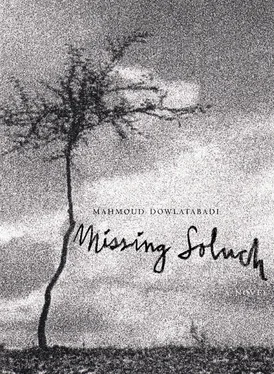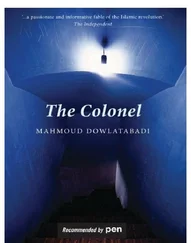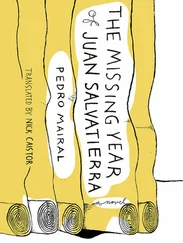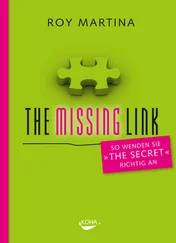Has Soluch really gone? Where to? What about me? And Hajer? And the boys — Abbas and Abrau? Soluch has gone! Where the hell has he gone to? Who does he think will protect us now?
Mergan was slowly coming to. Her eyes were slowly opening and comprehending what had happened. Once again, the pressure from a wild force was building up within her. Her eyes became themselves again. They apprehended what was around her clearly. Everything was alive, as if new. In the dry, cold heart of the winter, life was once again boiling up. It was as if everything had come back to life. It felt as if the field of ice that had surrounded and imprisoned Mergan for months was cracking. Mergan could move again. She’d gone from ice to fire. She was burning, and she wanted to burn. Covered in flames, like a cat drenched in gasoline and set alight. She felt the melting of all the ice in the world within herself. She was burning, so much so that she felt she could melt the head of winter itself. Speechless, silent. Silent and unresisting. The heart beating in Mergan’s chest was no heart. It was a furnace. A furnace of anger.
She came to. Despite these feelings, something drew her to keep her eyes on Soluch’s empty place. In Mergan’s eyes, Soluch’s empty spot sank slowly into the ground, deeper and deeper. It was a womb. It had the shape of one. With a place for a head, two legs pressed together, a bent back. Had Soluch really been so small as to fit inside that space?
Mergan turned away. Soluch’s granary was still in the middle of the yard, next to the pit. A granary only half-built. It had stands and the first level was finished; its walls were cracked and dried out. The intensity of the cold had left cracks in it. Soluch had left it there incomplete. He left it there half-built, in disgust. It had been a month that the clay oven had just been sitting there unfinished. No one had asked Soluch to build it. He’d just started building it one day, apparently out of boredom. And then a few days later he abandoned it just as suddenly. Why shouldn’t he have abandoned it? When there are no goods, no grain? What’s the point of a granary? And why build a clay oven? For whom? For which bread, which dough from what basin? What a waste, all the dirt that Soluch had carried on his back. What a waste, the clay that he used in the structure. What a waste, the sweat on his brow. What a waste, Soluch! He would kneed the clay, kneed it and shape it so much that he’d give it life. No baker could fashion his dough like that. Soluch worked like an alchemist — all the granaries, those full of flour and grains, all the new clay ovens of Zaminej had been shaped by the slim hands and gaunt fingers of Soluch. As long as they needed him, everyone considered Soluch an artisan. They saw him as someone with a different skill in each finger of his hand: Soluch the clay-oven maker, Soluch the pit digger, Soluch the dredger, Soluch the reaper, Soluch the room plasterer, Soluch the porter, Soluch the blacksmith … They even came from surrounding villages to take him to build their clay ovens. In Soluch’s fingers, mud became as pliable as wax.
May those fingers be adorned with flowers .
Now, Soluch’s legacy was only this unfinished, cracked granary. Was there a skilled granary builder in the place where Soluch had gone?
Abrau, Mergan’s second son, with his big ears and his wide and sleepy eyes stepped across the doorway into the yard and went straight to the ditch beside the wall. His mother passed him and disappeared inside the stable. To Abrau, his mother’s coming and going was different than it usually was. Today she was aimless, erratic. She couldn’t stay still. She came out the door and went to the porch, beside the clay oven. She seemed uneasy. Unconsciously, she made circles around herself, poked her head into this hole and that one, mumbling to herself.
“Gone. Fine! Gone … Gone. Ha! Let him go! Let him go to hell and back! Go. So what? What do I care? Go!”
Abrau looked at his mother and asked, “Who’s gone? Whom are you talking to?”
“He’s gone to hell. Gone to find his father there. Where that bastard came from. He’s gone to stop by his mother’s gravestone. What do I know? Gone. Just gone. Don’t you see? He’s not here. Before, when he’d leave, there’d be something of his left here. Somewhere around here. But today, there’s no sign, nothing!”
“What did he have to leave here every day? What could he take? Just his donkey skin, which he had with himself every day.”
Mergan was silent and confused. Anxiety was winning her over. She shook her hands uncontrollably, flapping them like a hen with its head cut off. She said to herself — and in response to her son, “I don’t know, myself. I don’t know. But it seems to me he’d always leave something of himself, something, behind. Didn’t he?”
“Like what?”
Mergan screamed at her son, “What do I know? What do I know? I don’t know. Maybe his cloak. His cloak!”
Abrau washed his hands and rose from the edge of the ditch. The cold water dripped from his fingers; he slid his hands under his armpits and went to continue talking to his mother. But Mergan was already leaving. She exited through the gap in the wall and walked up the alley facing the dry wind. Where should she go? Where was she going? The alley outside was empty, as all the alleys in the village were. The dry cold rose from the open fields and scraped its rough body against the walls and doorways of the village of Zaminej. The dogs, and only the dogs, were wandering the alleys. Skinny, sickly dogs. Pell-mell, barefoot, with only a thin shirt to warm her, Mergan made her way toward the house of the Kadkhoda, the village headman.
When she reached the central square, she saw Karbalai-Safi, the old father of the Kadkhoda, who was leaving the baths and sauntering up the alley. Karbalai-Safi was one of the whitebeards of Zaminej. Seeing him, Mergan had to stop and wait. She stood by the wall and said hello. Karbalai-Safi came forward, holding his side with one hand, caught his breath, and said, “Ah Mergan! Where to this early …? Afraid of something?”
Mergan suddenly realized she was shaking, so she hid her slim and drawn hands beneath her armpits while shuffling her feet. She said, “Soluch’s gone, Karbalai. He’s not here. Gone. Lost. Gone.”
Karbalai-Safi, not looking at Mergan, passed her while saying, “Wherever he’s gone, he’ll come back by himself. Where is that fool to go? Where could his feet take him to, anyway?”
Mergan followed along with Karbalai-Safi, and continued, “He’s not here! Not here, Karbalai. I know in my heart he’s gone. He leaves every morning early on, but today it was different. It’s as if he were never there.”
Karbalai-Safi stroked his beard for a moment without speaking and then pressed his thick and twisted fingers against the large, termite-marked door. The door opened with a dry, cold sound, and Karbalai-Safi entered the stone-floored vestibule, crossing to the courtyard with silent footsteps.
Mergan wasn’t sure what to do. She stood there, looking at the back of Karbalai-Safi’s head. He put one foot onto the brick stairs, lifting his rather heavy body carefully before disappearing across the veranda into the house. Mergan waited for a moment and then quietly entered the yard, sitting in a corner by the threshold of the doorway. The thought that the Kadkhoda was likely still asleep, and that she would have to wait there for him to wake up, stung at her. Despite this, she saw no other way. She’d have to stay where she was until something happened. Eventually someone came out, and a voice called out, “God is great.”
The sound of Karbalai-Safi’s prayer arose in the air. After that, Moslemeh, the Kadkhoda’s wife, began to make sounds as she did her chores. There were sounds of pots and pans and the clang of a basin. The sounds of plates and copper placemats scraping, mixed with the grumbling of Moslemeh, clashed against the tenor of Karbalai-Safi’s words.
Читать дальше












